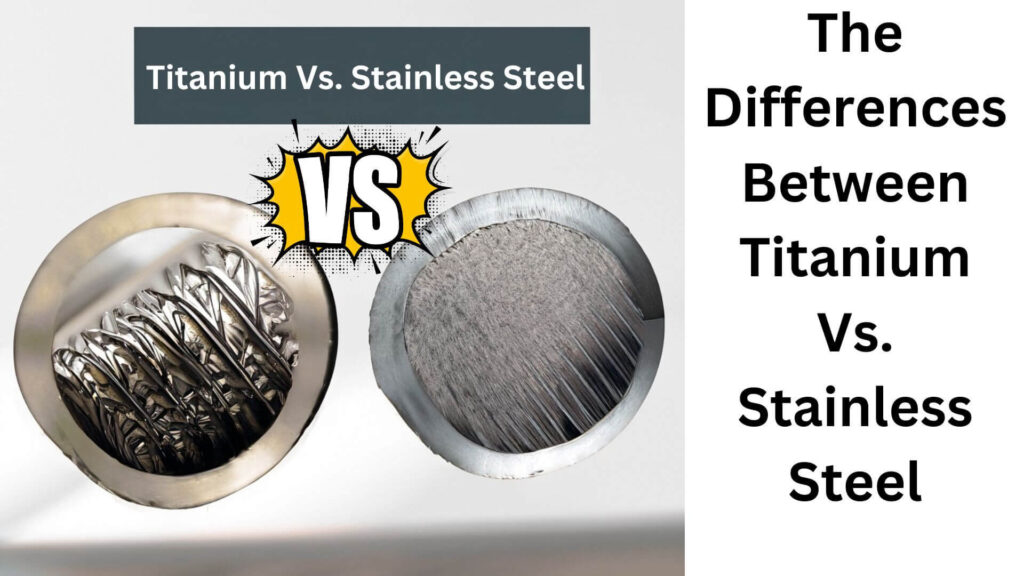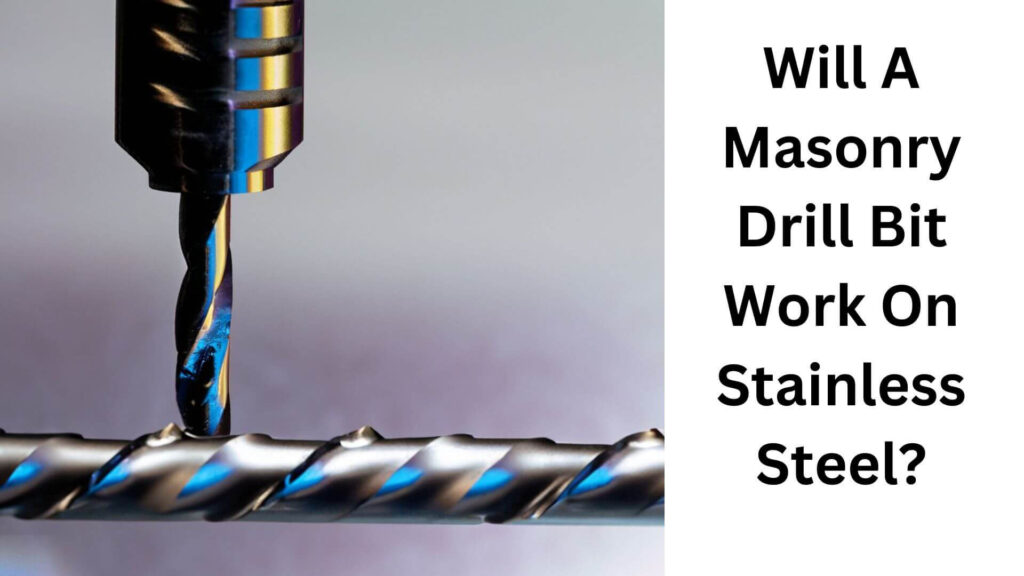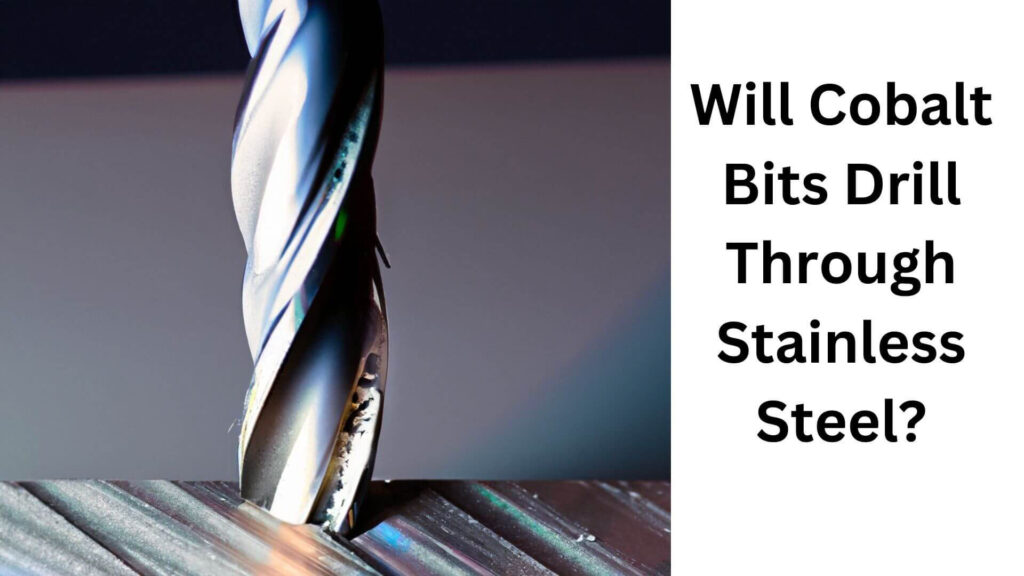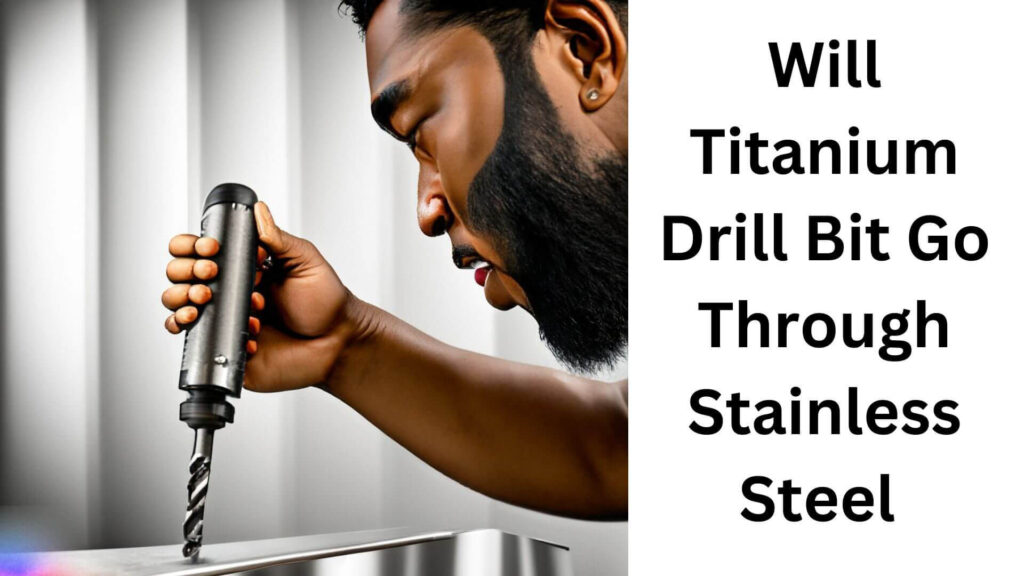Are you working on a DIY project that involves drilling through stainless steel? So you might wonder, will the titanium drill bit go through stainless steel? The short answer is yes; a Titanium drill bit goes through stainless steel.
But it’s more complex than picking up any titanium drill bit and expecting it to work. Several factors come into play when drilling through stainless steel, such as speed, pressure, heat, and lubrication.
In this blog post, I’ll dive deeper into the world of drilling through stainless steel with a titanium drill bit. I’ll explore the properties of stainless steel and titanium drill bits, discuss the different types of drill bits, and provide step-by-step instructions on how to drill through stainless steel with a titanium drill bit.
So, if you’re ready to learn more and take on your next DIY project with confidence, keep reading!
Table of Contents
The Differences Between Titanium Vs. Stainless Steel

Before diving into whether a titanium drill bit can go through stainless steel, let’s look at the two materials. Here’s a table outlining the differences between titanium and stainless steel:
| Feature | Titanium | Stainless Steel |
| Strength | Stronger than steel but less stiff | Strong and stiff |
| Weight | Lightweight | Heavy |
| Corrosion resistance | Highly resistant to corrosion | Resistant to corrosion, but not as much as titanium |
| Appearance | The greyish-white colour can be anodized for colour | Silver color |
| Biocompatibility | Highly biocompatible, often used in medical implants | Biocompatible, but not as much as titanium |
| Cost | More expensive than stainless steel | Less expensive than titanium |
Overall, titanium is stronger, more corrosion-resistant, and biocompatible than stainless steel but is also more expensive.
Stainless steel, on the other hand, is solid and stiff, but titanium is more lightweight and corrosion-resistant.
The choice between the two materials ultimately depends on the specific application and desired properties.
Read More: 9 Best Drill Bit For Stainless Steel
Factors Affecting Drilling Through Stainless Steel with a Titanium Drill Bit
When drilling through stainless steel with a titanium drill bit, several factors can affect the outcome of the process. Understanding these factors and how to manage them can make all the difference in achieving a successful result.
- Speed: The speed at which you drill is crucial. Drilling too slowly can overheat the drill bit and damage it while drilling too quickly can cause the drill bit to slip and potentially cause injury. It is essential to choose the right speed for the job, determine the optimal speed for drilling stainless steel, and adjust the speed during the drilling process.
- Pressure: Pressure is another essential factor when drilling through stainless steel. Applying too much pressure can cause overheating and damage to the drill bit, while not applying enough pressure can slow down the drilling process. It is essential to maintain consistent pressure while drilling.
- Heat: Heat is generated during the drilling process, and if not managed properly, it can warp or even melt the stainless steel. It is essential to prevent overheating during drilling and to allow the drill bit to cool down between drilling sessions.
- Lubrication: Lubrication is crucial in the drilling process, as it helps to reduce friction and dissipate heat, preventing damage to both the drill bit and the stainless steel. It is vital to use the correct type of lubricant for stainless steel, apply it effectively while drilling, and understand the benefits of lubrication during the process.
Considering these factors and taking the necessary precautions, you can increase your chances of successfully drilling through stainless steel with a titanium drill bit.
Other essential factors to consider include the type and size of the drill bit to use, how to sharpen the drill bit, and safety precautions to take during the drilling process.
Read More: How to Remove a Broken Drill Bit from Stainless Steel
Can a Titanium Drill Bit Go Through Stainless Steel?
A titanium drill bit can go through stainless steel. However, some important considerations must be remembered to ensure a successful drilling process.
- First, it’s essential to use a high-quality titanium drill bit designed for drilling through metal. Look for a drill bit made from high-speed steel and coated with titanium nitride, which can help improve the bit’s durability and performance.
- Second, using the correct drill bit size for the job is essential. If the bit is too tiny, it may not be able to cut through the stainless steel. On the other hand, if the bit is too large, it may cause the metal to warp or crack.
- Third, it’s essential to use the proper drilling technique. Make sure to apply steady pressure and avoid pushing too hard, which can cause the bit to overheat and dull quickly. Also, use a lubricant, such as oil or cutting fluid, to help keep the bit cool and prevent it from overheating.
Can Black Oxide Drill Bit Drill Through Stainless Steel?
Yes, black oxide-coated drill bits can be used to drill through stainless steel. The black oxide coating on the drill bit helps to increase its hardness and durability, allowing it to withstand the heat and friction generated during the drilling process.
However, it’s important to note that drilling through stainless steel can be challenging due to its hardness and toughness, so using a slow drilling speed and plenty of cutting fluid is recommended to help prevent overheating and premature wear of the drill bit.
Using a high-quality drill bit designed for drilling through stainless steel can also help ensure a successful outcome.
Can Carbide Drill Bits Cut Stainless Steel?
Yes, carbide drill bits can be cut through stainless steel. Carbide is a challenging and durable material often used in high-performance cutting tools such as drill bits.
Compared to other types of drill bits, carbide bits are better suited for cutting hard materials like stainless steel due to their exceptional hardness and resistance to wear.
However, it’s important to note that drilling through stainless steel can be challenging due to its hardness and toughness.
Therefore, using a slow drilling speed and plenty of cutting fluid is recommended to help prevent overheating and premature wear of the carbide drill bit.
A high-quality carbide drill bit designed for cutting through stainless steel can also help ensure a successful outcome.
Will A Masonry Drill Bit Work On Stainless Steel?

A masonry drill bit is designed for drilling into brick, concrete, and stone. It typically has a hardened steel tip coated with a material such as tungsten carbide to provide extra durability when drilling through hard, abrasive materials.
While it is technically possible to use a masonry drill bit to drill into stainless steel, it is not recommended. The tip of a masonry drill bit is not designed to withstand the hardness and toughness of stainless steel, and attempting to drill through it could cause the bit to become dull or break.
Generally, it is best to use a drill bit specifically designed for the type of material you are drilling into. A high-quality drill bit made of cobalt, carbide, or high-speed steel would be better for drilling through stainless steel.
Will Cobalt Bits Drill Through Stainless Steel?

Yes, cobalt drill bits can drill through stainless steel. Cobalt is a rigid, heat-resistant material often used in high-performance drill bits.
Compared to other drill bits, cobalt bits are better suited for cutting hard materials like stainless steel due to their exceptional hardness, resistance to wear, and ability to dissipate heat generated during the drilling process.
However, it’s important to note that drilling through stainless steel can be challenging due to its hardness and toughness.
Therefore, using a slow drilling speed and plenty of cutting fluid is recommended to help prevent overheating and premature wear of the cobalt drill bit.
A high-quality cobalt drill bit designed for cutting through stainless steel can also help ensure a successful outcome.
Read More: What Angle Drill Bit For Stainless Steel?
Bonus Tips for Drilling Through Stainless Steel with a Titanium Drill Bit
Here are some additional tips to help ensure a successful drilling process when using a titanium drill bit to go through stainless steel:
- Use a drill press instead of a hand-held drill. This can help ensure more accurate and precise drilling.
- Start with a small pilot hole, then gradually increase the bit size until you reach the desired size. This can help prevent the bit from wandering and improve accuracy.
- Use a centre punch to mark the spot where you want to drill. This can help keep the bit from wandering and improve accuracy.
- Take breaks as needed to allow the bit to cool down. This can help prevent overheating and extend the life of the bit.
- Wear protective gear, such as safety glasses and gloves, when drilling through metal. This can help prevent injury from flying debris and metal shavings.
How To Care And Maintenance Of Titanium Drill Bit Go Through Stainless Steel?
Caring for and maintaining your titanium drill bits is essential for their optimal performance, especially when drilling through stainless steel. Here are some additional tips to follow:
Use the correct drill bit size: When drilling through stainless steel; it’s crucial to use the correct size of the titanium drill bit. Using a bit that is too small or too large can damage the bit or the material being drilled.
Use lubricant: Drilling through stainless steel can generate heat and friction, causing your titanium drill bit to overheat or dull quickly. Using a fat like cutting oil or even water can help reduce heat and extend the life of your bit.
Use a slow speed and low pressure: Stainless steel is a complex and challenging material, and drilling through it requires patience and precision. Use a slow drilling speed and low pressure to prevent overheating and prolong the life of your bit.
Clean and sharpen your bit: After drilling through stainless steel, clean your bit thoroughly to remove any debris or particles that may have adhered to it. Sharpen your bit regularly to maintain its cutting-edge performance.
Store your bits correctly: Store your titanium drill bits in a dry and cool place, away from moisture and high temperatures, to prevent rust and corrosion.
By following these tips, you can ensure that your titanium drill bits remain in excellent condition
and perform optimally when drilling through stainless steel.
Faqs For Will Titanium Drill Bit Go Through Stainless Steel?
What’s the best drill bit for stainless steel?
A high-quality titanium drill bit designed for drilling through metal is a good choice for drilling through stainless steel.
Can I use a regular drill bit to go through stainless steel?
Using a regular drill bit to go through stainless steel is possible, but it may not be as effective as a high-quality titanium drill bit.
Can I use a hammer drill to go through stainless steel?
Yes, a hammer drill can go through stainless steel, but using a high-quality carbide-tipped masonry bit is essential for drilling through metal.
What lubricant should I use when drilling through stainless steel?
When drilling through stainless steel, you can use oil or cutting fluid as a lubricant. This can help keep the bit cool and prevent overheating.
How can I tell if I’m using too much pressure when drilling through stainless steel?
If you notice the bit is getting excessively hot or smoking, it’s a sign that you may be using too much pressure. Back off the pressure and take a break to allow the bit to cool down.
In Summary
In conclusion, a titanium drill bit can go through stainless steel, but using the correct bit, size, and technique is essential to ensure a successful drilling process. Following the tips outlined in this article, you can drill through stainless steel confidently and precisely.

Hey, I am Shihab Uddin, I’m a huge fan of DIY crafts. My workshop is where I spend most of my spare time, and I’m always working on some project. To that end, I’d like to share some of my knowledge and experience with you in power tools, woodworking, and other specialized materials fabrication.
I will guide you with genuine knowledge that can assist you with deciding whether a drill is appropriate according to your requirements or not. If you want to find the best drill and know which type of drill is most suited for your needs, then I can guide you with my expertise. My passion lies in helping others find the correct products they need at an affordable price.


